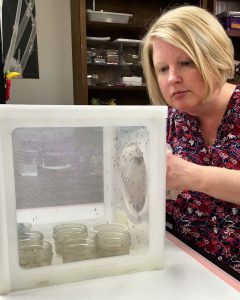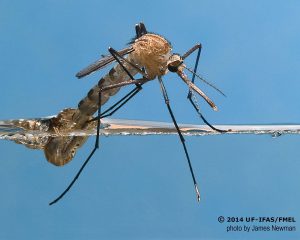VERO BEACH, Fla. – A University of Florida scientist is collaborating with Miami-Dade Mosquito Control to evaluate and determine the most effective insecticides to control the mosquito that spreads the West Nile virus that is impacting three south Florida counties.
South Florida is currently experiencing a West Nile virus outbreak. As of August 11, the Florida Department of Health (FDOH) reported 31 confirmed cases in Miami-Dade County and 1 confirmed case in Palm Beach County. Out of the 32 confirmed human infections, 24 were asymptomatic and 8 were symptomatic. Researchers are working around the clock to find the most effective integrated mosquito management practices.

Eva Buckner, an assistant professor and medical entomology state Extension specialist at UF/IFAS Florida Medical Entomology Lab, has been monitoring the outbreak while working closely with the Centers for Disease Control and Prevention (CDC), Miami-Dade Mosquito Control, and FDOH. Through an FDOH grant, in the amount of $178,161, Buckner and Barry Alto, a UF/IFAS associate professor of entomology, have been working with the entities on “Improving our understanding of domestic mosquito control of Aedes aegypti, Ae. albopictus, and Culex quinquefasciatus through assessments of insecticide susceptibility.” The grant closes in December 2020.
West Nile virus is the leading cause of mosquito-borne disease in the continental United States. It is most spread to people by the bite of an infected mosquito. Cases of West Nile occur during mosquito season, which starts in the summer and continues through fall. While symptoms vary greatly, there are no vaccines to prevent or medications to treat in humans according to the CDC. That is where science-based research designed to help choose the right insecticide to kill the mosquito spreading West Nile virus enters the picture.
Miami-Dade County Mosquito Control has been sending samples of mosquitos to the CDC for testing, and the CDC has found numerous testing positive for West Nile virus containing just one species: the southern house mosquito, Culex quinquefasciatus, said Buckner.

“This suggests that the southern house mosquito is most likely the mosquito species responsible for transmitting West Nile virus to humans in the current Miami-Dade outbreak,” added Buckner. “Southern house adult mosquitoes are frequently found to be resistant to insecticides, and resistance in Miami-Dade populations could be affecting the ability of Miami-Dade Mosquito Control to curtail the current virus outbreak.”
Buckner is working with FDOH to determine the insecticide resistance of southern house, Asian tiger, and yellow fever mosquito populations across Florida to better control them. Mosquito control programs throughout the state have been sending Buckner’s lab mosquito eggs that she and her lab technicians rear to adulthood, test for resistance, and determine which insecticides used by mosquito control programs result in the highest mortality rates. She then provides the resistance data for the insecticides tested and resistance management recommendations based on that data to the mosquito control program managers.
“Miami-Dade County Mosquito Control is one of the programs that we have been working closely with and have provided resistance data and management recommendations for multiple yellow fever mosquito populations in areas where the Zika virus outbreak occurred in 2016,” said Buckner.
During the weeks of July 27th and August 3rd, Buckner’s lab received egg samples of the southern house mosquito causing the West Nile virus from multiple locations in Miami-Dade County collected by Miami-Dade Mosquito Control. While more will be needed to complete the work, Buckner is in the process of getting Miami-Dade County Mosquito Control information on which insecticides kill the highest percentage of their southern house mosquitoes.
“This information could potentially help reduce the number of virus human infections in Miami-Dade County, before neighboring counties are impacted further.” said Buckner.
While Miami-Dade Mosquito Control works to control the southern house mosquito and West Nile virus, residents are encouraged to do their part with this important effort. Information specifically for residents on how to reduce mosquitoes around homes can be found here: Mosquitoes and their Control: Integrated Pest Management for Mosquito Reduction around Homes and Neighborhoods.
-30-
By: Lourdes Rodriguez, 954-577-6363 office, 954-242-8439 mobile, rodriguezl@ufl.edu
The mission of the University of Florida Institute of Food and Agricultural Sciences (UF/IFAS)
is to develop knowledge relevant to agricultural, human and natural resources and to make
that knowledge available to sustain and enhance the quality of human life. With more than
a dozen research facilities, 67 county Extension offices, and award-winning students and faculty
in the UF College of Agricultural and Life Sciences, UF/IFAS brings science-based solutions
to the state’s agricultural and natural resources industries, and all Florida residents.
 0
0
